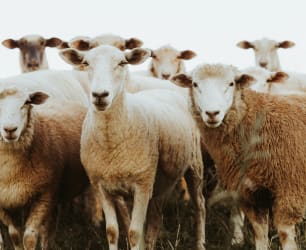RESEARCH into lowering greenhouse gas emissions from agricultural practices will be spearheaded by South Australia through an $8.4m commitment alongside partnerships between the State and Federal Governments and industry.
Led by the South Australian Research and Development Institute (SARDI), the research will be essential to help the state reach Net Zero by 2050, which will help to preserve SA’s environment for generations to come, and to support producers to maintain market access and establish new markets.
The South Australian Government has committed to reduce greenhouse gas emissions by at least 60 per cent from 2005 levels, by 2030, and to achieve net zero greenhouse gas emissions by 2050.
In South Australia, the agricultural sector was estimated to account for 37 per cent of our greenhouse gas emissions in 2022.
There are a number of sources of greenhouse gas emissions generated in the agricultural sector and on farms in South Australia. Fertiliser production and use make up a large proportion of the emissions challenge for South Australian grain farmers, producers, and growers, followed by methane released by livestock.
This methane is produced by cows, sheep, and goats in their stomach, which is then released into the atmosphere, mostly when burping or through flatulence.
The June state budget committed $8.4m over five years and will leverage Commonwealth and industry contributions of $16m over five years, to a total of $24.4m.
This will establish the essential industry partnerships and collaborations necessary to reduce the state’s greenhouse gas emissions.
South Australia’s $18.5bn agriculture sector will benefit from this next generation research and development that will build on the active initiatives in emissions reduction and sustainability that SARDI is undertaking, including;
Methane mitigation:
Testing existing products or identifying novel bioactive molecules for livestock that result in less methane production while not impacting reproduction success, the quality of wool, milk, and meat products for producers.
Plant breeding and selection: Plant breeding and trials to determine new feed base options which roaming livestock could eat, which naturally decrease the amount of methane produced. This is a key consideration required to address methane produced from pasture-based ruminant systems in South Australia.
Agronomy and soils: Undertaking research aimed at improving soils to increase the opportunity for atmospheric carbon storage, or the expansion of legume crop production to reduce synthetic nitrogen use.

Management for mitigation: Supporting SA producers to ensure they have access to the emission reduction solutions they need, as well as the new information and technology as quickly as possible as it is developed. Much of this research will be undertaken at SARDI innovation farms, or in partnership with farming systems groups and growers, located across a range of the key rainfall and climate zones throughout South Australia, where new innovations will be trialled as they become available, and new research will be conducted to investigate new solutions. This will ensure that farmers have early access to new solutions which are designed to reduce the emission of greenhouse gases from our unique SA farming systems and regions.
Minister for Primary Industries and Regional Development Clare Scriven said “the global agricultural market is demanding that producers demonstrate their commitment to reducing emissions and using sustainable agricultural practices to maintain market access and competitiveness”.
“This pressure will only increase in the years to come,” Ms Scriven said.
“We have already reached a 50 per cent reduction from 2005 levels. But to reach net zero by 2050 we really need to act now across all sectors, and this commitment is the first step towards our agriculture sector – which employs so many South Australians across our regions – to reach this target “SARDI is already doing great work in this space, including undertaking research and development in greenhouse gas emissions reduction and sustainability, such as methane mitigation in livestock and agronomic practices to reduce inputs and improve carbon sequestration.
“It is important to note this funding isn’t just to implement products into farms now, but it is also about the investment into the necessary research so the right solutions for our unique and beautiful environment can be developed into the future. I look forward to seeing the innovative research and development that will be achieved through this commitment to help us get to net zero and preserve our state for generations to come.”
McCabe AgCo owner and manager Adrian McCabe said “as multi-generational farmers, embracing net zero targets for South Australia aligns with our long-standing commitment to ‘doing more with less’ by optimising resource use and minimising waste, which has always been a core principle of our farming practices”.
“By focusing on improving natural capital, including enhancing soil health, and maximising water and nitrogen use efficiency, we can leave the land in better condition for future generations while producing food for a growing global population,” Mr McCabe said.
“South Australia’s distinct soils and climate enable us to grow legumes, leading to a production system with the lowest emissions intensity globally, positioning us perfectly for the journey of South Australia towards net zero.”






